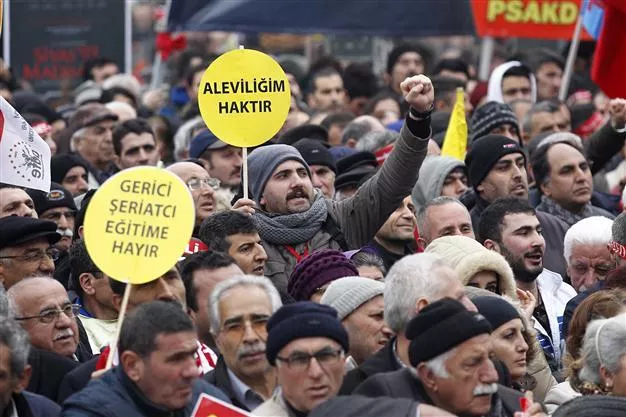« Many Alevi associations have objected to the agency’s placement with the Culture Ministry, which they say demonstrates the government’s refusal to recognize Alevis as a religious community » reports Nazlan Ertan in Al-Monitor.
In a controversial pre-election move directed at Turkey’s Alevi population, President Recep Tayyip Erdogan has established a new public agency to coordinate Alevi places of worship.
The new body, attached to the Ministry of Culture and Tourism, will research the needs of the cemevis — the Alevi community’s houses of worship — as well as Alevism and Bektashism, according to the decree. It also sees the establishment of an 11-strong consultative body, all of them selected by the president.
Though it’s possible Erdogan intends to reach out to some members of the 20-million-strong minority — which is not part of Erdogan’s traditional voting base — its initial reaction is suspicion. As the so-called Agency for Alevi-Bektashi Cultural Centers and Cemevis was pushed through parliament Tuesday, many Alevi groups demonstrated against it outside, with police setting barriers to keep the demonstrators away.
Many members of the Alevi community and the opposition parties criticized the bill as a cosmetic step that ignores the community’s actual needs and denies it recognition as a religious and not a cultural community. Alevis, Turkey’s second-largest minority group, represent a distinct and often ostracized branch of Islam. Like the Shiites, they venerate Ali, the Prophet Muhammad’s son-in-law, but their faith is a unique version of Islam that mixes Sufi traditions with Anatolian folklore. Men and women worship alongside one other.
“What the Alevis want is the recognition of their cemevis as places of worship, not as cultural centers,” Mithat Sancar, the co-chair of the pro-Kurdish People’s Democracy Party, said in the parliamentary debate. “They want a liberal, secular education for their children » rather than a curriculum that focus on Sunni Islam and refer to Alevism as a culture.
Sancar said that the government’s plan to creating an agency under the Ministry of Culture treats Alevism as a cultural community and falls short of what Alevis want and what international bodies demand from Ankara.
“This law reduces their rightful struggle on constitutional rights to electricity bills and subsidies,” he added, referring to the government’s promise that the cemevis will now benefit from government subsidies just like mosques, synagogues and churches.
Sancar said that the Justice and Development Party (AKP) government, instead of respecting the rulings of European courts on Turkey’s Alevi community, seeks to exploit the Alevi situation as a campaign strategy to “divide the community.”
“The police attacked our Alevi brothers who are demonstrating against the bill outside the parliament and one of the community leaders, Celal Firat was taken to the hospital,” he added.
In a statement from the hospital, Firat, the head of the Alevi Associations Federation, reiterated that the Alevis want cemevis to be recognized as places of worship and not as cultural centers along with equal rights as citizens.
The police suppression of the demonstrators outside parliament was also criticized by Server Unsal, from the main opposition Republican People’s Party (CHP). “The police have set up barricades and used gas against Alevi citizens who want equal citizenship. Your law is just for show,” he said.
Erdogan posted a celebratory message on the new law. « I hope this step, one of our democratization reforms, will benefit our country and our Alevi-Bektashi brothers and sisters, » he tweeted. Members of his government followed suit, including Culture and Tourism Minister Mehmet Nuri Ersoy and Interior Minister Suleyman Soylu.
Erdogan’s overture follows a series of attacks against Alevi leaders and places of worship in Istanbul and Ankara in August. Following the attacks, Erdogan paid a visit to the Huseyin Gazi cemevi in Ankara for the first time in his 20 years of rule. The hastily-arranged visit created a division among the Alevi community, some of whom refused to attend the gathering they called a political show.
The Alevi community’s distrust in the government stems partly from previous derogatory remarks by members of the ruling party, including the president himself. When he was the mayor of Istanbul, Erdogan, a devout Sunni, referred to cemevis (cemevleri in Turkish) as “cumbusevleri,” a play of words that means “houses of spree.” More recently, he has said in the past that cemevis were cultural centers and that Muslims “worshipped in mosques,” which can be interpreted to mean that Alevis are not real Muslims.
Turkey’s Alevis have faced centuries of violence and discrimination at the hands of the country’s Sunni Muslim majority. Persecuted as heretics in Ottoman times, they remained on the state’s watch list during the republic due to their strong leftist leanings and ethnically Kurdish segments. In 1993, a crowd of Sunni fanatics set fire to the Madimak Hotel in the central Anatolian city of Sivas, where famous Turkish author Aziz Nesin was holding a conference. They killed some 37 intellectuals, mostly Alevis. The Alevi community’s demand for the hotel be transformed into a museum was ignored.
Turkey’s Alevi community has been signaling for more than a decade that discrimination is creeping up to dangerous levels. Community leaders blame Erdogan, charging that he is recklessly playing the sectarian card for political ends, keen to keep his Sunni base tight. But going forward to elections, Erdogan appears eager to court some of the Alevi vote from the CHP, whose leader Kemal Kilicdaroglu is an Alevi from Dersim.
“The reason we Alevis support Kilicdaroglu is not because he is an Alevi,” Haydar Baki Dogan, the chair of the Federation of Alevi Foundations, told the leftist daily Birgun. “We will support the candidate of the six-party opposition, whether it is Kilicdaroglu or someone else.”
Al-Monitor, November 9, 2022, Nazlan Ertan

